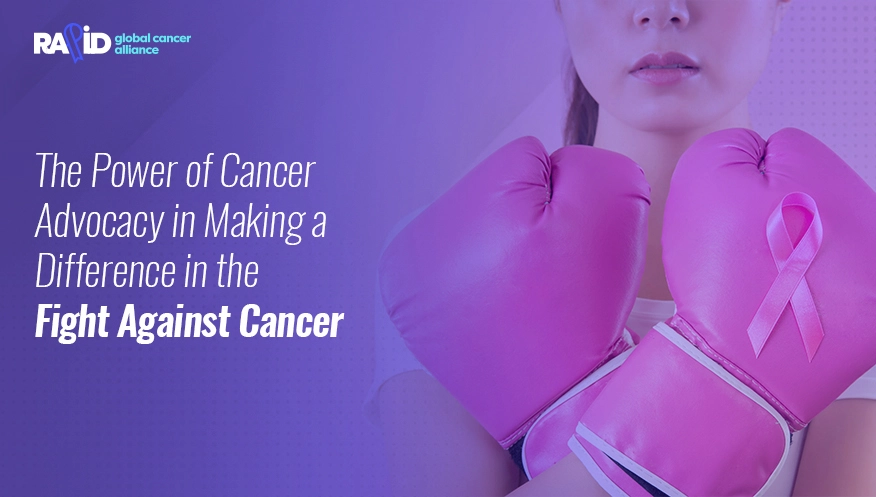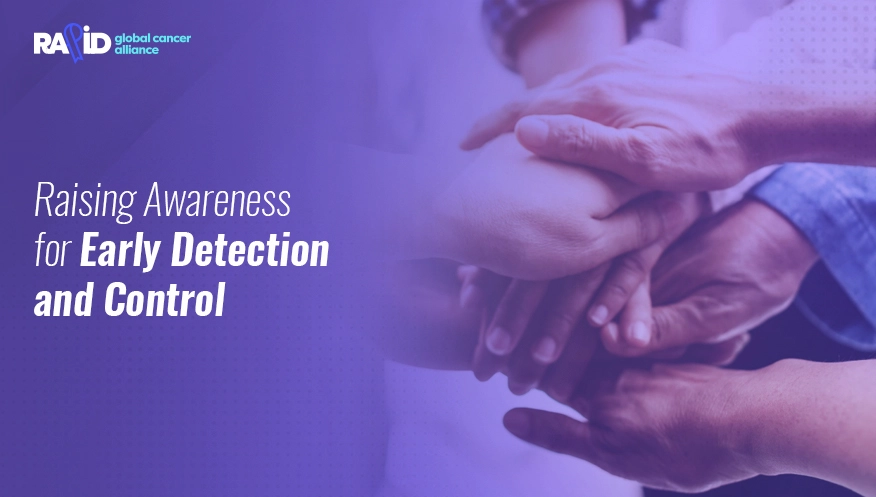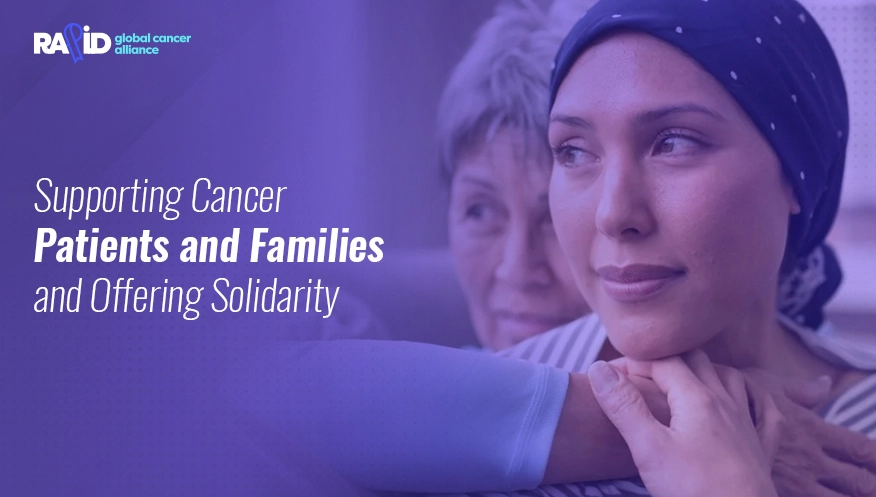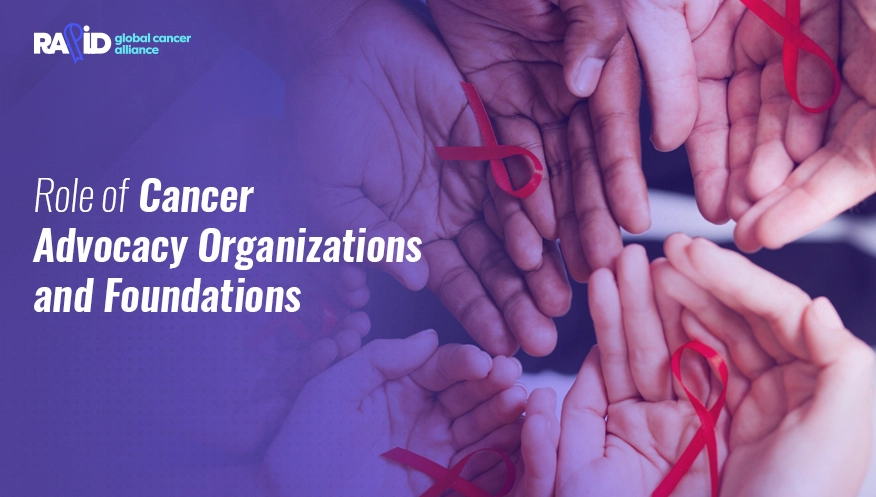
Cancer is a formidable foe, affecting millions of lives worldwide. It knows no boundaries, targeting individuals irrespective of age, gender, or socio-economic status. However, in the battle against cancer, there is a force that has been steadily gaining momentum and making a profound impact – cancer advocacy, the article explores the pivotal role that cancer advocacy, supported by organizations like the Rapid Global Cancer Alliance, play in raising awareness, advancing cancer control and prevention efforts, and providing vital support to cancer patients and their families.
Cancer Advocacy- A Catalyst for Change
Cancer advocacy is the voice of those affected by cancer, rallying for change, raising awareness, and pushing for policies that improve cancer care and research. These advocates, often cancer survivors themselves or those who have witnessed the devastating effects of cancer in their families, are instrumental in driving change at multiple levels. They collaborate with healthcare professionals, policymakers, and researchers to create a united front against this pervasive disease while also advocating for better regulations, patient support and in – depth research and development for better treatment options. The collective power of cancer advocacy is amplified through dedicated organizations and groups. Cancer advocacy groups and organizations such as the Rapid Global Cancer Alliance provide structure, resources, and a platform for advocates to amplify their voices. They act as a hub for advocacy efforts, facilitating collaboration, and organizing campaigns, conferences, and events to promote cancer awareness and control.
Raising Awareness for Early Detection and Control
 One of the primary functions of cancer advocacy is to raise awareness about cancer. Through campaigns, educational programs, and outreach initiatives, cancer advocates strive to ensure that the public is well-informed about the risks, prevention strategies, early detection, and available treatments. Increased awareness leads to greater engagement in cancer prevention and control efforts. Also, by helping people recognise the signs and symptoms early, cancer advocacy helps people in seeking medical interventions early, which goes a long way in better cancer control and improved health outcomes for all.
One of the primary functions of cancer advocacy is to raise awareness about cancer. Through campaigns, educational programs, and outreach initiatives, cancer advocates strive to ensure that the public is well-informed about the risks, prevention strategies, early detection, and available treatments. Increased awareness leads to greater engagement in cancer prevention and control efforts. Also, by helping people recognise the signs and symptoms early, cancer advocacy helps people in seeking medical interventions early, which goes a long way in better cancer control and improved health outcomes for all.
Removing Stigma and Dismantling Myths
In many countries cancer is often stigmatised and there is a sense of shame and fear associated with the disease. Owing to misinformation and prejudices people often lack empathy, kindness and solidarity when it comes to cancer. Fearing mistreatment, families often hide the truth and patients suffer in silence and isolation. Awareness about cancer and cancer advocacy are powerful tools in challenging the stigma and shame associated with cancer. They help educate the public, provide support to those affected, and promote positive attitudes and behaviours. By fostering empathy, understanding, and acceptance, these efforts contribute to a more compassionate and informed society in which cancer patients are treated with dignity and respect.
Better Policy Regulations for Cancer Prevention and Affordable Treatment
Prevention is often the most effective strategy in the fight against cancer. Cancer advocacy groups work tirelessly to advocate for policies and initiatives that promote healthy lifestyle choices, early screenings, and vaccination programs where applicable. By promoting cancer prevention, these advocates contribute significantly to reducing the overall burden of cancer on society. By advocating for accessible and affordable cancer treatment, cancer advocates play a significant role in urging the government for policy regulations that empower patients, early diagnosis and cost-effective cancer treatment and management.
Supporting Cancer Patients and Families and Offering Solidarity
 Cancer patient advocates are a powerful force within the advocacy community. They bring firsthand knowledge of the challenges and struggles faced by cancer patients and their families. These advocates work to ensure that patients receive the best possible care, support, and access to treatment options. They champion policies that improve the patient experience, including reducing financial burdens and enhancing the quality of life for cancer survivors.
Cancer patient advocates are a powerful force within the advocacy community. They bring firsthand knowledge of the challenges and struggles faced by cancer patients and their families. These advocates work to ensure that patients receive the best possible care, support, and access to treatment options. They champion policies that improve the patient experience, including reducing financial burdens and enhancing the quality of life for cancer survivors.
Cancer advocacy is not just about policy change; it’s also about providing a support system for those affected by cancer. Cancer support centres, often established and maintained by cancer advocacy organizations, offer a range of services, including counselling, support groups, financial assistance, and resources for patients and their families. These organisations play a crucial role in helping individuals navigate the physical, emotional, and financial challenges of cancer.
Role of Cancer Advocacy Organizations and Foundations
 The establishment of cancer advocacy organizations and foundations has been pivotal in providing relevant information and a accessible cancer care ecosystem. These organizations often collaborate with healthcare institutions, research centers, and policymakers to drive change in cancer care and research. Their work extends beyond awareness campaigns, making tangible contributions to the fight against cancer.
The establishment of cancer advocacy organizations and foundations has been pivotal in providing relevant information and a accessible cancer care ecosystem. These organizations often collaborate with healthcare institutions, research centers, and policymakers to drive change in cancer care and research. Their work extends beyond awareness campaigns, making tangible contributions to the fight against cancer.
Cancer advocacy programs are instrumental in educating and empowering advocates. These programs offer training, resources, and networking opportunities to individuals interested in becoming cancer advocates. They equip advocates with the knowledge and skills needed to effectively communicate their message, engage with policymakers, and drive change for better cancer care.
The Rapid Global Cancer Alliance: A Force for Change
 One prominent example of a cancer advocacy organization making a significant impact is the Rapid Global Cancer Alliance. This alliance brings together individuals, organizations, and experts from around the world to collaborate on cancer control and prevention efforts. By uniting diverse voices and resources, it has the power to drive rapid progress in the fight against cancer. The online platforms and initiatives of the Rapid Global Cancer Alliance creates impactful understanding on all aspects of cancer right from diagnosis to palliative care.
One prominent example of a cancer advocacy organization making a significant impact is the Rapid Global Cancer Alliance. This alliance brings together individuals, organizations, and experts from around the world to collaborate on cancer control and prevention efforts. By uniting diverse voices and resources, it has the power to drive rapid progress in the fight against cancer. The online platforms and initiatives of the Rapid Global Cancer Alliance creates impactful understanding on all aspects of cancer right from diagnosis to palliative care.
Conclusion
Cancer advocacy is a powerful force that continues to make a significant difference in the global fight against cancer. With the support of organizations like the Rapid Global Cancer Alliance, cancer advocates are raising awareness, advocating for prevention and control measures, championing patient rights, and providing crucial support to those affected by cancer. As we move forward in the battle against this devastating disease, cancer advocacy will remain a vital catalyst for change, driving progress and improving the lives of millions of people worldwide. Together, as a global community, we can work towards a future where cancer is no longer the formidable foe it is today. Together we can unveil a world that possesses the best of knowledge and research to fight cancer and bring down its instances, for the betterment of human beings.
